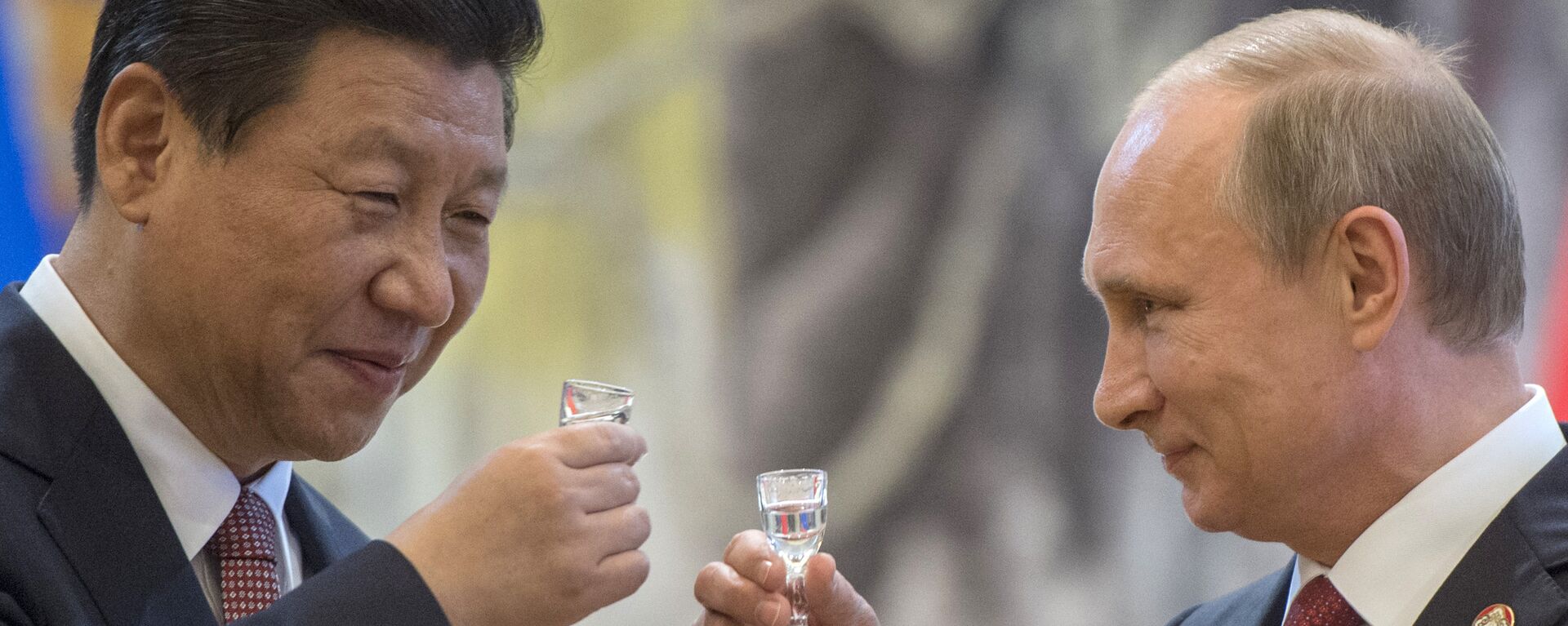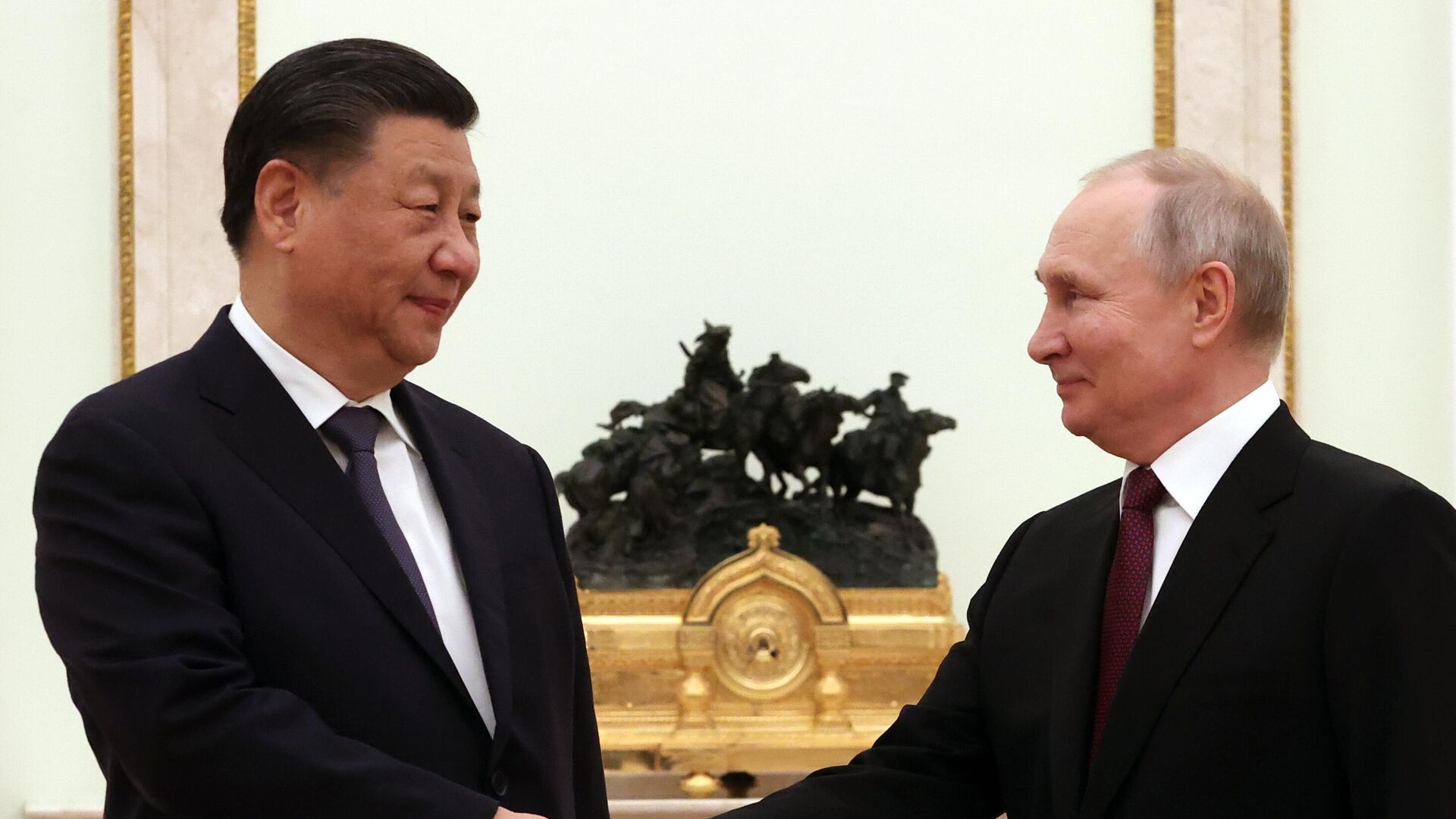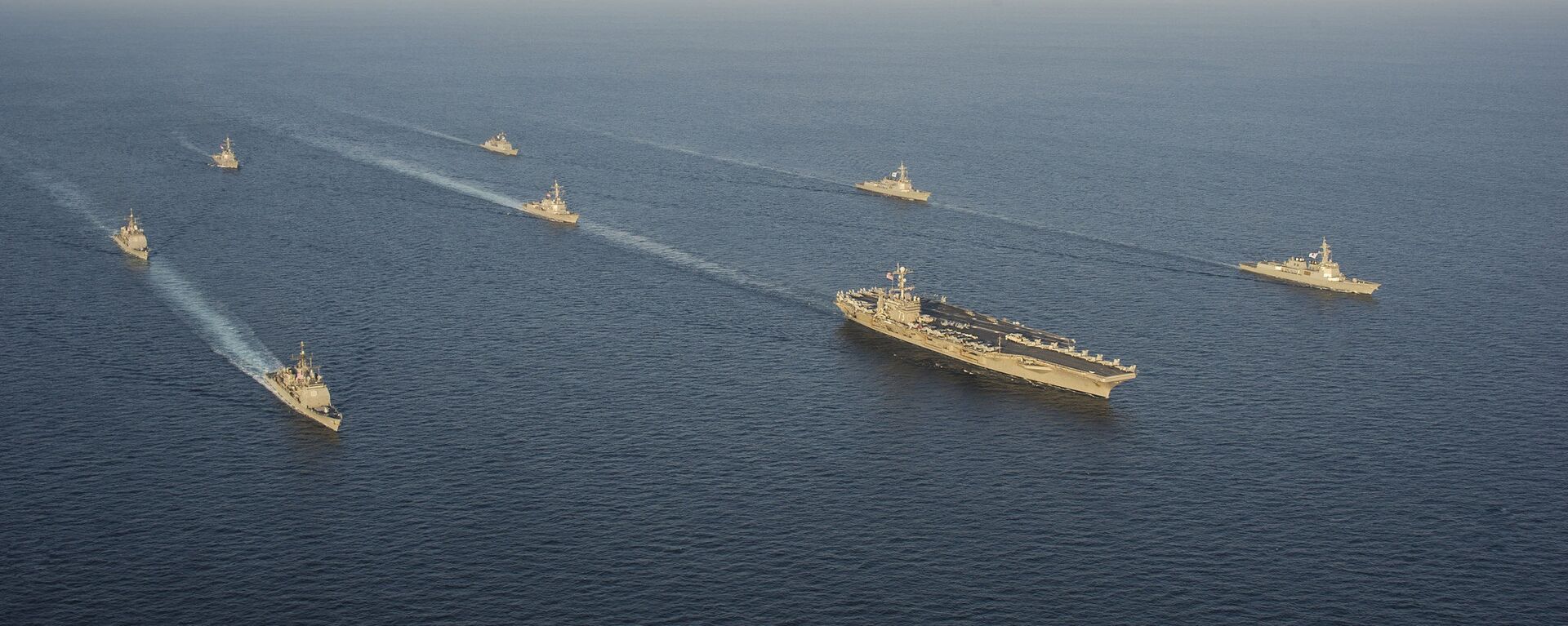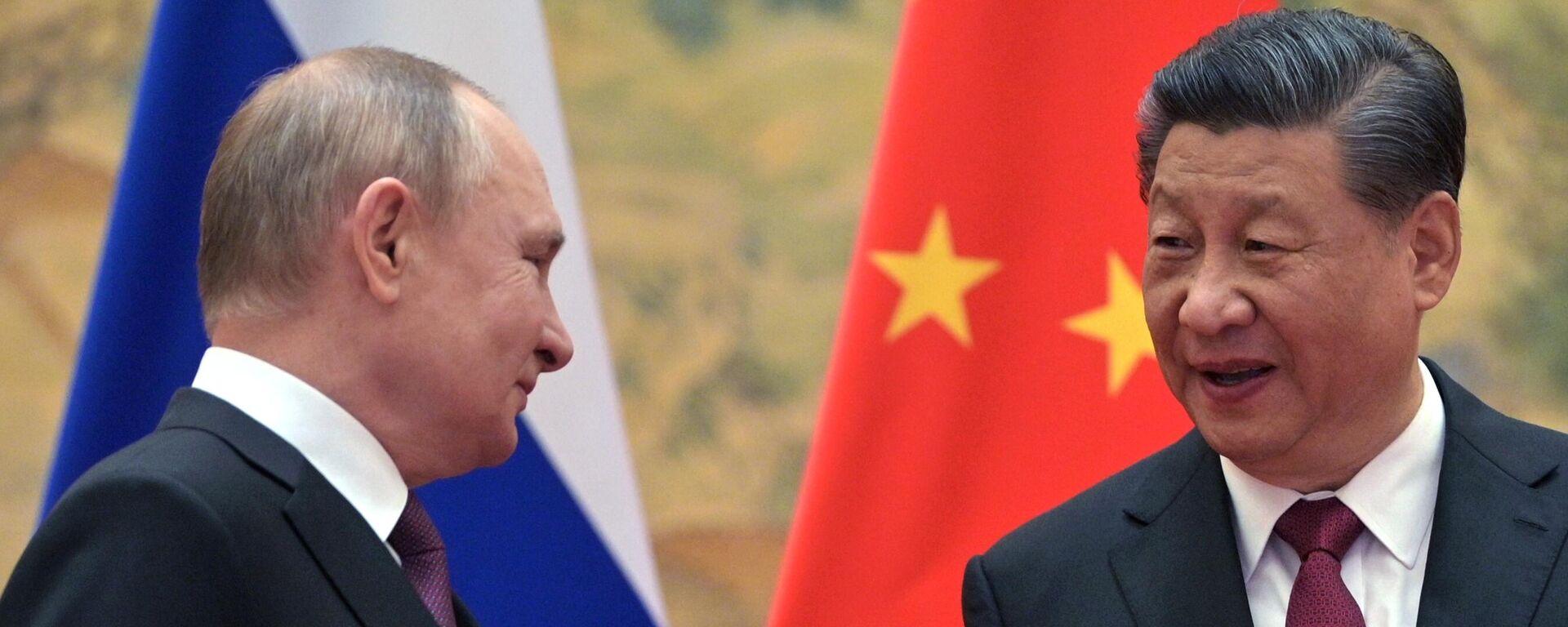https://sputnikglobe.com/20230322/xi-putin-meeting-marks-tectonic-geopolitical-shift-which-west-not-ready-for-1108697550.html
Xi-Putin Meeting Marks Tectonic Geopolitical Shift Which West Not Ready for
Xi-Putin Meeting Marks Tectonic Geopolitical Shift Which West Not Ready for
Sputnik International
The meeting of Russian President Vladimir Putin and his Chinese counterpart Xi Jinping in Moscow is due to usher in dramatic geopolitical changes, shifting the... 22.03.2023, Sputnik International
2023-03-22T16:40+0000
2023-03-22T16:40+0000
2023-03-22T16:40+0000
analysis
us
opinion
china
communist party of china (cpc)
asia-pacific region
russia
vladimir putin
xi jinping
multipolarity
https://cdn1.img.sputnikglobe.com/img/07e7/03/14/1108609763_0:0:2929:1648_1920x0_80_0_0_9469e5cc3107d67ce9bc4b708aa3925f.jpg
"The Putin-Xi summit would be most likely recorded in history as one of the most important, most great, and most gargantuan geopolitical, geo-economic, strategic-military events in the 21st century," Dr. Kiyul Chung, editor-in-chief at 4th Media and a visiting professor at Tsinghua University, told Sputnik.Chinese President Xi Jinping paid a three-day visit to Moscow at the invitation of his Russian counterpart, Vladimir Putin, on March 20-22. Earlier, Chairman Xi was unanimously reelected for a third term on March 10. Observers have drawn attention to the fact that Russia became the first foreign state visited by Xi after his reelection.Kiyul outlined three major takeaways of the meeting: First, the two leaders made it clear that the arrival of the “multipolar world” is now “irreversible”.Second, they kicked off the process of a tectonic shift from the Western-led colonial, dictatorial, and imperial “unipolar world order” to a multipolar world based on mutual respect, peaceful coexistence, and co-prosperity.Third, the leaders voiced growing concerns with bellicose actions by the US and its NATO allies, encompassing “military biological activities”; the US “build-up of potential in precise non-nuclear weapons for conducting a disarming strike" and "aspiration to deploy ground-based missiles" of various types in both Europe and the Asia-Pacific; and finally the US military buildup in the Asia Pacific within the framework of the AUKUS pact which includes the reinforcement of the Australian military with nuclear attack submarines.'China is Serious About Becoming Major Diplomatic Player'On Wednesday, Chinese media highlighted that the Xi-Putin meeting has sent an important signal to promote peace talks over Ukraine. It pointed out that Moscow reaffirmed its commitment to the resumption of peace talks as soon as possible and welcomed China's "willingness to play a positive role for the political and diplomatic settlement of the Ukraine crisis."In February, Beijing released a 12-point proposal that called for the resumption of peace talks between Kiev and Moscow; keeping nuclear power plants safe and reducing strategic risks; stopping unilateral sanctions and abandoning the Cold War mentality; and promoting post-conflict reconstruction in Ukraine.The Biden administration immediately subjected Beijing to criticism and claimed that the peace proposal was nothing short of a distraction from the alleged "imminent threat" of China supplying lethal weapons to Russia, an assumption shredded by both Moscow and Beijing.Meanwhile, in March, the People's Republic of China brokered a historic reconciliation between Iran and Saudi Arabia. The two rivals signed an agreement to restore full diplomatic relations, elevating China's status as an influential mediator.At the same time, it is clear that "China is serious about becoming a major diplomatic player [after the Iran-Saudi deal]," according to Jonathan Sullivan, professor of political science and director of China Programs at the University of Nottingham's Asia Research Institute in the UK.China's peace efforts come in accordance with the country's new Global Security Initiative. The document, which was published last month, lays out practical measures to address current security challenges. Beijing's Global Security Initiative emphasizes: "The Cold War mentality, unilateralism, bloc confrontation and hegemonism contradict the spirit of the UN Charter and must be resisted and rejected."West is Not Ready for New Multipolar OrderIt appears that the West has been caught off guard by the geopolitical changes propelled by Moscow and Beijing, according to Thomas W. Pauken II.The decision by the Russian and Chinese leadership to further facilitate trade in national currency will in the long-run challenge to the dollar, Pauken admitted, adding, however, that the greenback is still deeply entrenched in the global financial system: hence the phrase, "when America sneezes, the world catches a cold."However, given that Russia has been decoupled from the Western-led financial system since the beginning of the special military operation in Ukraine, Moscow's financial institutions have become to some extent "immune" from the banking crisis, engulfing the US and Europe, as per Kremlin spokesman Dmitry Peskov.Russo-Sino Hi-Tech Clusters & InnovationsPutin and Xi also agreed on the pre-2030 development plan with priorities in China-Russia economic cooperation in trade, investment, finance, hi-tech, manufacturing and agriculture.Even though the Biden administration slapped tough sanctions on Beijing and Moscow's hi-tech sector, seeking to sever them from semiconductor, super-computing and AI technologies, the Chinese and Russians are likely to make progress in this field nonetheless, according to Pauken."Obviously the West would be very frightened of that because of the power of AI and IT," the Beijing-based commentator said. "There's so much involved in this type of technology in how we live our lives. And AI is also going to have a dramatic impact. So what I'm saying is that the West is going to have major worries about China and Russia becoming AI superpowers. It's going to be hard for the world to accept that, but obviously, there are advantages for China and Russia to move forward."Pauken expressed confidence that Russo-Sino cooperation will result in the development of joint high-tech clusters, as well as innovation in the science and high-tech field."In that sense, by doing that, they're going to be able to have more success in regards to counteracting a lot of the sanctions that are ongoing right now or that will come about in the near future," the commentator concluded.
https://sputnikglobe.com/20230222/how-russo-chinese-strategic-cooperation-may-bring-us-forever-wars-to-end-1107713826.html
https://sputnikglobe.com/20230322/us-increasing-military-presence-in-asia-pacific-region-to-deter-russia-china-shoigu-says--1108682980.html
https://sputnikglobe.com/20230321/china-reiterates-readiness-to-play-constructive-role-in-settlement-of-ukraine-crisis-1108639204.html
china
russia
ukraine
Sputnik International
feedback@sputniknews.com
+74956456601
MIA „Rossiya Segodnya“
2023
News
en_EN
Sputnik International
feedback@sputniknews.com
+74956456601
MIA „Rossiya Segodnya“
Sputnik International
feedback@sputniknews.com
+74956456601
MIA „Rossiya Segodnya“
xi-putin meeting, xi's visit to moscow, xi's visit to russia, joint statement of xi and putin, russia-china cooperation, russia and china enhance strategic partnership, china's 12-point peace proposal for ukraine, china brokered peace between iran and saudi arabia, russia and china call for multipolar world order, china's global security initiative
xi-putin meeting, xi's visit to moscow, xi's visit to russia, joint statement of xi and putin, russia-china cooperation, russia and china enhance strategic partnership, china's 12-point peace proposal for ukraine, china brokered peace between iran and saudi arabia, russia and china call for multipolar world order, china's global security initiative
Xi-Putin Meeting Marks Tectonic Geopolitical Shift Which West Not Ready for
The meeting of Russian President Vladimir Putin and his Chinese counterpart Xi Jinping in Moscow is due to usher in dramatic geopolitical changes, shifting the focus from unilateral hegemony to a more cooperative, equal and democratic world order, international observers told Sputnik.
"The Putin-Xi summit would be most likely recorded in history as one of the most important, most great, and most gargantuan geopolitical, geo-economic, strategic-military events in the 21st century," Dr. Kiyul Chung, editor-in-chief at 4th Media and a visiting professor at Tsinghua University, told Sputnik.
Chinese President Xi Jinping paid a three-day visit to Moscow at the invitation of his Russian counterpart, Vladimir Putin, on March 20-22. Earlier,
Chairman Xi was unanimously reelected for a third term on March 10. Observers have drawn attention to the fact that Russia became the first foreign state visited by Xi after his reelection.
Kiyul outlined three major takeaways of the meeting: First, the two leaders made it clear that the arrival of the “multipolar world” is now “irreversible”.
Second, they kicked off the process of a tectonic shift from the Western-led colonial, dictatorial, and imperial “unipolar world order” to a multipolar world based on mutual respect, peaceful coexistence, and co-prosperity.
Third, the leaders voiced growing concerns with bellicose actions by the US and its NATO allies, encompassing “military biological activities”; the US “build-up of potential in precise non-nuclear weapons for conducting a disarming strike" and "aspiration to deploy ground-based missiles" of various types in both Europe and the Asia-Pacific; and finally the US military buildup in the Asia Pacific within the framework of the AUKUS pact which includes the reinforcement of the Australian military with nuclear attack submarines.
"Today’s historic meeting by the two leaders is the 40th since the beginning of Chairman Xi’s presidency which started in March 2013," Kiyul emphasized. "From that angle, aspect, and point of view, one can safely assert or assess both leaders’ geopolitical, geo-economic, and strategic military understanding of today’s world which has been for centuries unilaterally dictated, controlled, and manipulated by the Washington-led unipolar power or by the 'Collective West'."

22 February 2023, 17:29 GMT
'China is Serious About Becoming Major Diplomatic Player'
On Wednesday, Chinese media highlighted that the Xi-Putin meeting has sent an important signal to promote peace talks over Ukraine. It pointed out that Moscow reaffirmed its commitment to the resumption of peace talks as soon as possible and welcomed China's "willingness to play a positive role for the political and diplomatic settlement of the Ukraine crisis."
In February, Beijing released a 12-point proposal that called for the resumption of peace talks between Kiev and Moscow; keeping nuclear power plants safe and reducing strategic risks; stopping unilateral sanctions and abandoning the Cold War mentality; and promoting post-conflict reconstruction in Ukraine.
The Biden administration immediately subjected Beijing to criticism and claimed that the peace proposal was nothing short of a distraction from the alleged "imminent threat" of China supplying lethal weapons to Russia, an assumption shredded by both Moscow and Beijing.
Meanwhile, in March, the People's Republic of China brokered a historic reconciliation between Iran and Saudi Arabia. The two rivals signed an agreement to restore full diplomatic relations, elevating China's status as an influential mediator.
"I think what's going on is they [Middle Eastern countries] realized that the United States was supposed to be the peacemaker in the Middle East, but instead [it] sparked a lot of endless wars and created a lot of turmoil in the region," Thomas W. Pauken II, the author of ‘US vs China: From Trade War to Reciprocal Deal,' a consultant on Asia-Pacific affairs and a geopolitical commentator, told Sputnik. "I think a lot of people are starting to wake up to the fact that the United States, as this so-called stabilizing peacemaker, may not be the case."
At the same time, it is clear that "China is serious about becoming a major diplomatic player [after the Iran-Saudi deal]," according to Jonathan Sullivan, professor of political science and director of China Programs at the University of Nottingham's Asia Research Institute in the UK.
"Of course, the US is also not thrilled by the prospect of another potential diplomatic win for China [after Iran-Saudi]," Sullivan told Sputnik.
China's peace efforts come in accordance with
the country's new Global Security Initiative. The document, which was published last month, lays out practical measures to address current security challenges. Beijing's Global Security Initiative emphasizes:
"The Cold War mentality, unilateralism, bloc confrontation and hegemonism contradict the spirit of the UN Charter and must be resisted and rejected."West is Not Ready for New Multipolar Order
It appears that the West has been caught off guard by the geopolitical changes propelled by Moscow and Beijing, according to Thomas W. Pauken II.
"I don't think the West right now understands the changes that are going to happen," Pauken told Sputnik. "I think about a year ago or two years ago, I said that with this changing world order you're going to see the Middle East drawn closer to Russia and China and pulled away against the West. So when Iran and Saudi Arabia now have closer ties together, this also shows it's not just going to be Russia and China, but the Middle East is now undergoing dramatic changes (…) That will impact the global economy because the Middle East also has lots of energy resources."
The decision by the Russian and Chinese leadership to further facilitate trade in national currency will in the long-run challenge to the dollar, Pauken admitted, adding, however, that the greenback is still deeply entrenched in the global financial system: hence the phrase, "when America sneezes, the world catches a cold."
However, given that Russia has been decoupled from the Western-led financial system since the beginning of the special military operation in Ukraine, Moscow's financial institutions have become to some extent "immune" from the banking crisis, engulfing the US and Europe, as per Kremlin spokesman Dmitry Peskov.
Russo-Sino Hi-Tech Clusters & Innovations
Putin and Xi also agreed on the pre-2030 development plan with priorities in China-Russia economic cooperation in trade, investment, finance, hi-tech, manufacturing and agriculture.
Even though the Biden administration slapped
tough sanctions on Beijing and Moscow's hi-tech sector, seeking to sever them from semiconductor, super-computing and AI technologies, the Chinese and Russians are likely to make progress in this field nonetheless, according to Pauken.
"Obviously the West would be very frightened of that because of the power of AI and IT," the Beijing-based commentator said. "There's so much involved in this type of technology in how we live our lives. And AI is also going to have a dramatic impact. So what I'm saying is that the West is going to have major worries about China and Russia becoming AI superpowers. It's going to be hard for the world to accept that, but obviously, there are advantages for China and Russia to move forward."
Pauken expressed confidence that Russo-Sino cooperation will result in the development of joint high-tech clusters, as well as innovation in the science and high-tech field.
"In that sense, by doing that, they're going to be able to have more success in regards to counteracting a lot of the sanctions that are ongoing right now or that will come about in the near future," the commentator concluded.





